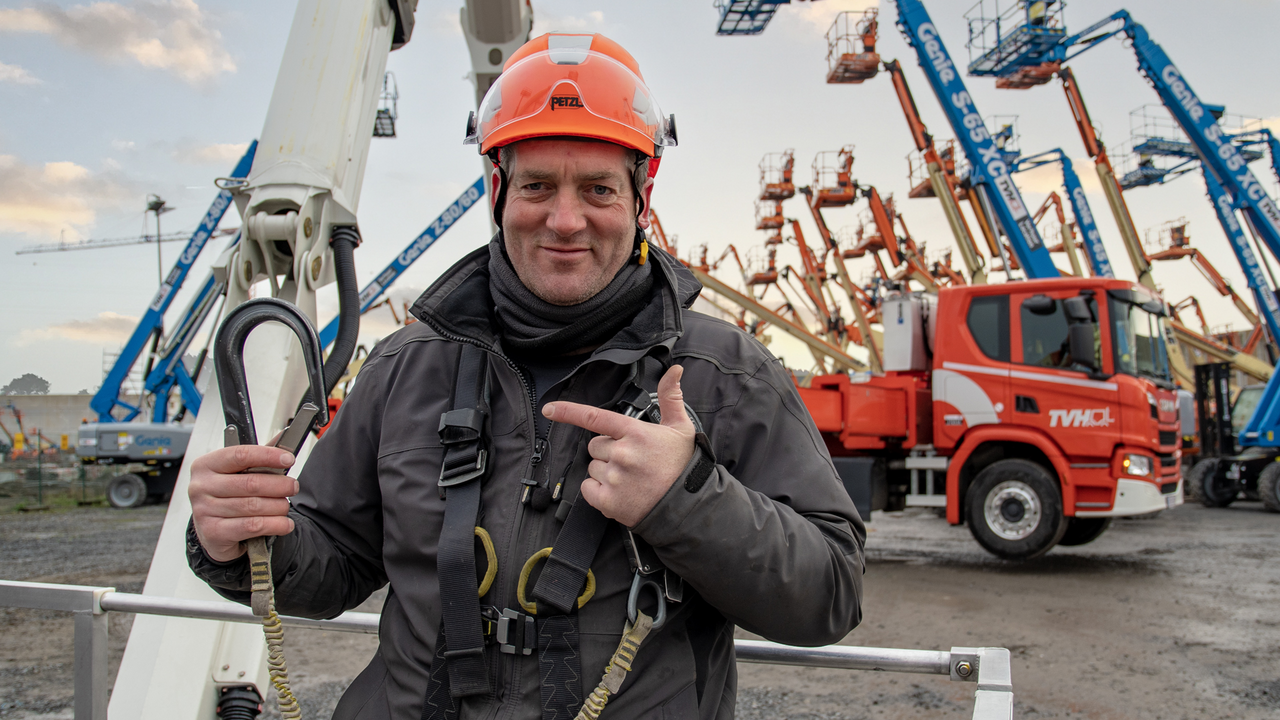How do you work safely with machinery?

TVH Equipment's machines are all technically tested and in tip-top order. So you can work perfectly safely with them. The human factor remains: prevention advisor Heidi Debrabandere and Stan Vandemoortele, instructor at TVH Academy, explain how proper guidance and follow-up can make the difference.
Can everyone drive forklifts, telehandlers and aerial work platforms?
Heidi: "You have to be 18 years old, medically fit and have had a recognized training. After all, driving a powered vehicle is not as easy as people sometimes think. An accident happens quickly and can have extremely serious consequences. If it goes really badly wrong, not only the victim but also the family and immediate colleagues are often scarred for life."
Stan: "For me, this story starts in the company's HR department. It has to attract the right profiles to work with machines: people with the necessary sense of responsibility, who understand why it is so important to protect yourself and others properly. On the second level, I put the managers: they have to keep an eye on the shop floor every day and intervene in time if necessary. And, of course, it is crucial to receive proper training. There are 6 trainers at TVH Academy: we all have extensive theoretical knowledge, practical experience and broad didactic skills. Moreover, we invariably start from real work situations in the field."
What does such a training course look like in concrete terms?
Stan: "We have three different formulas, but the structure is always the same: we start with some theory and then move on to practice, with a maximum of two students per machine. That way everyone gets the chance to practice extensively. Each session ends with an exam. The one-day course is intended for employees who only occasionally operate a machine or who want to refresh their basic knowledge and skills. We organize the three-day for the real warehouse professionals: people who will work with it every day but have never seen such a machine up close. And on the two-day we host workers who are somewhat in between. In all three cases, we deliberately limit the group to about 10 participants: after all, we consider personal follow-up and good interaction between trainer and course participant to be elementary."
What do you emphasize in the training?
Stan: "Above all, people must realize that these are heavy and potentially dangerous machines. In the event of an accident, the impact on both people and infrastructure is immediately huge. Always looking in the direction of travel, using your levers correctly: these are things we work very hard on. With aerial work platforms, the 'working at height' aspect is an extra factor to take into account."
Heidi: "We continue to impress on people that fall protection is an absolute necessity in this regard. Then again, in a forklift it is mandatory to use your belt. It all starts with the understanding that a certain behavior is unsafe. But in practice, even people with a lot of experience sometimes barely know how to wear a fall harness correctly or how the emergency system works."
So in addition to the technical mastery of the device, you also pay a lot of attention to safety awareness?
Stan: "Definitely and definitely! Quite a few people indulge in cockiness or boastfulness: they overestimate themselves and think they have everything perfectly under control. Also, drudgery and routine can literally kill. If you have to do the same actions over and over again, your attention may eventually wane."
Heidi: "If you drive a car and don't follow the rules, sooner or later you are bound to get caught. But those who get their attestation to drive a machine only have to prove every five years that they can still do it. So discipline has to come largely from the people themselves. Fortunately, in most larger companies there is an internal prevention advisor to point this out to them from time to time. In smaller construction and installation companies, on the other hand, safety awareness sometimes seems to be insufficiently anchored. That is why proper training is also so important."
Where can customers interested in TVH Academy go?
Stan: "We provide training at our headquarters in Waregem and our branches in Londerzeel and Nivelles. On request, we also come to the customer. That allows us to give even more targeted, customized advice and practice concrete work situations with the machines people work with every day."
Is a good knowledge of Dutch required to successfully complete the training?
Stan: "The working language is Dutch, French or English, but our questionnaires are also available in Polish, Romanian, Hungarian, Turkish and Russian. Even though we all speak the universal language of security, many people find it convenient and comfortable to be able to receive the basic info also in their own language."
All training courses at TVH Academy are SCC-compliant, meet legal requirements and can be financed through the SME portfolio. In addition to some 20 driver training courses for specific machines, there are also two pure safety courses with VCA-VOL and VCA Basis. TVH Academy is recognized by the main sector funds. You can find all the details in our training brochure which you can download here.
Keine Kommentare
